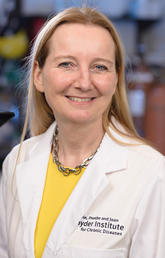Oct. 18, 2021
Killam Emerging Research Leader Awards recognize outstanding contributions of early-career faculty

The University of Calgary’s 2021 Killam Emerging Research Leader Awards go to three scholars who are pushing the boundaries of research in their fields. Every year, the university awards Killam Trusts funds to recognize faculty who have made exceptional contributions to research early in their careers.
“These researchers are paving the way for cutting-edge discovery and innovation at the University of Calgary,” says Dr. William Ghali, vice-president (research). “We recognize the Killam Emerging Research Leaders’ commitment to research impact in their fields and are thrilled to celebrate this milestone early in their careers.”
The Killam Emerging Research Leader Awards are given for research related to the mandate of each of Canada’s research councils: the Canadian Institutes of Health Research, the Natural Sciences and Engineering Research Council, and the Social Sciences and Humanities Research Council.
Dr. Kirsten Fiest, PhD, associate professor, Cumming School of Medicine (CIHR)
A member of the Hotchkiss Brain Institute and O’Brien Institute for Public Health, Fiest is also the director of research and innovation for the Department of Critical Care Medicine at the University of Calgary and Alberta Health Services - Calgary Zone. Her work is focused on brain and mental health, and advancing the science of critical care research. She is passionate about improving care in the intensive care unit (ICU) and is leading the initiative to better engage patients and families to ensure that their care across the health-care continuum is seamless. The recipient of numerous awards, Fiest has been cited over 6,000 times in five years.
Learn more about Fiest and the Calgary Critical Care Research Network.
Dr. Régine King, PhD, associate professor, Faculty of Social Work (SSHRC)
King’s innovative program of research, knowledge mobilization strategies and promotion of social change advance the key priorities of the institution embedded in equity, diversity and inclusion. She has extensively published and presented on refugee mental health and alternative interventions, reconciliation and peacebuilding, creating impact and influencing change across the globe. Through her work on contemporary social issues, genocide and decolonization, King is amplifying the experiences of those living “at the edge” of society. She has authored more than 30 peer-reviewed publications, including nine book chapters and 20 peer-reviewed articles. She has also used various community forums, national and international conference presentations, public speaking, and numerous media outlets to share her knowledge and study results.
Learn more about King’s research.
Dr. Gregory Welch, PhD, professor, Faculty of Science (NSERC)
Welch’s work focuses on printed electronics, where he uses chemistry to develop organic materials capable of being printed into electronic and light active films or nanoparticles with use in numerous contexts, including semitransparent solar cells, flexible light emitting diodes, and smart sensors. His accomplishments are creating new pathways in research and product development, positioning the institution as a leader in this field. During his second Canada Research Chair appointment, Welch expanded his research enterprise to create a “lab-to-fab” operation, enabling in-house fabrication and characterization of next-generation devices related to energy, health, and the environment. He has published 134 scientific papers, trained over 60 highly qualified personnel, and has nine issued patents with an additional five pending.
Learn more about Welch and the Functional Materials and Advanced Coatings Laboratory.





